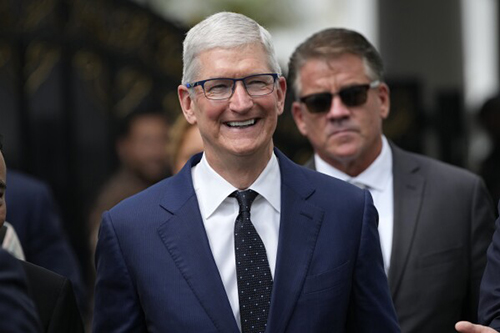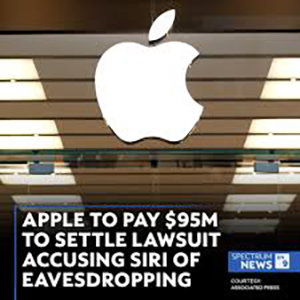|
Getting your Trinity Audio player ready...
|
Edited by: TJVNews.com
In a significant legal development, Apple has agreed to pay $95 million to settle a five-year-old lawsuit accusing the tech giant of violating customer privacy through its virtual assistant, Siri. According to a report by The Associated Press (AP), the lawsuit alleged that Siri was improperly activated, enabling Apple to eavesdrop on private conversations without users’ knowledge or consent. The settlement, filed on Tuesday in a federal court in Oakland, California, still requires final approval from U.S. District Judge Jeffrey White.
While Apple maintains that it did not admit to any wrongdoing, the lawsuit raises troubling questions about the company’s commitment to user privacy—a principle long championed by CEO Tim Cook as a “fundamental human right.”
As reported by the AP, the lawsuit accused Apple of allowing Siri to be surreptitiously activated on iPhones and other Apple devices, recording users’ private conversations even when they did not use the trigger phrase “Hey, Siri.”
These unauthorized recordings allegedly included sensitive conversations and private exchanges that users never intended for Siri to capture. The lawsuit further claimed that some of these recordings were shared with advertisers, enabling them to target users with tailored ads based on information obtained from these private exchanges.

These allegations directly contradict Apple’s highly publicized commitment to privacy, with Tim Cook frequently framing data protection and user privacy as central pillars of Apple’s corporate ethos.
Despite agreeing to the $95 million settlement, Apple denied any wrongdoing or violation of privacy laws. As noted by the AP, this resolution allows Apple to avoid a lengthy and potentially damaging trial that could have forced the company to disclose sensitive internal processes about how Siri processes and handles data.
The settlement also comes at a time when public concern about digital privacy and tech surveillance is at an all-time high, further amplifying the significance of the case.
If the settlement is approved by the court during a hearing scheduled for February 14, 2025, consumers who owned Siri-enabled Apple devices between September 17, 2014, and December 2023 will be eligible to file claims, according to the information provided in the AP report.
Eligible consumers could receive up to $20 per Siri-enabled device, depending on the volume of claims submitted. Claims will be limited to a maximum of five devices per consumer. Legal experts expect only about 3% to 5% of eligible consumers to file claims, a typical turnout rate in settlements of this kind.
This limited participation means that actual payouts per device may fluctuate based on the total number of claims filed.
While $95 million is a substantial sum, it represents only a tiny fraction of Apple’s profits over the years. As reported by the AP, Apple has earned approximately $705 billion in profits since September 2014.
Even if Apple had lost the lawsuit in court, the maximum estimated financial liability was about $1.5 billion—far exceeding the settlement amount.
This disparity reflects the reality that, despite the financial payout, the settlement is unlikely to have any significant financial impact on Apple’s bottom line.
The legal team representing the consumers in this case plans to seek up to $29.6 million from the $95 million settlement fund to cover attorney fees and related legal expenses. This fee represents nearly one-third of the total settlement amount.
While such attorney payouts are common in class-action lawsuits, they often spark debate about whether consumers—the intended beneficiaries—receive adequate compensation relative to the legal fees.
The allegations and subsequent settlement have placed Apple’s privacy-focused image under scrutiny. Tim Cook has consistently portrayed Apple as a leader in digital privacy, positioning the company as a counterbalance to other tech giants frequently criticized for their handling of user data.
As reported by the AP, the case serves as a stark reminder of the challenges Apple faces in aligning its public commitments to privacy with the complex realities of managing vast amounts of user data across millions of devices.
The Siri settlement may have broader implications beyond Apple, as it raises critical questions about the ethical use of virtual assistants and data privacy standards across the tech industry. Other companies with voice-activated assistants—such as Amazon’s Alexa and Google Assistant—will likely face renewed scrutiny regarding their data collection and privacy practices.
This case also highlights the legal vulnerabilities of voice-activated technology and serves as a cautionary tale for tech companies navigating the intersection of convenience, surveillance, and privacy.
The proposed settlement now awaits approval from U.S. District Judge Jeffrey White, with a hearing set for February 14, 2024, in Oakland, California. If approved, Apple will begin notifying eligible consumers about the claims process, providing instructions on how to submit claims for compensation.
As the AP report emphasized, this case serves as an important moment in the ongoing debate over consumer privacy, corporate accountability, and the ethical boundaries of AI-powered technologies.
The $95 million Siri settlement may represent only a minor financial dent for Apple, but it serves as a symbolic victory for digital privacy advocates. According to The Associated Press, the case calls attention to the growing expectation that tech companies must uphold the highest standards of transparency and accountability when handling sensitive user data.
While Siri continues to evolve as a sophisticated AI tool, the settlement sends a clear message: privacy isn’t optional, and violations will come with consequences. For consumers, the Siri settlement highlights the need for continued vigilance and legal safeguards in an era where virtual assistants are becoming increasingly integrated into everyday life.





